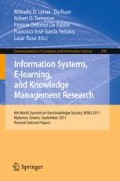Abstract
The number of merchants and consumers that participate in b2c e-commerce is still growing. Overall fraud rates have stabilized in recent years but for post-payment transactions in the Netherlands the fraud percentage remains unacceptably high. Companies often have a great deal of knowledge about fraudulent orders, and how to recognize them. Fraud prevention is often aided by automated recognition systems that are created through data mining. There have been few studies examining the combination of explicit domain knowledge and data mining. This study analyses the incorporation of domain knowledge in data mining for fraud prediction based on a historical dataset of 5,661 post-payment orders.
Access this chapter
Tax calculation will be finalised at checkout
Purchases are for personal use only
Preview
Unable to display preview. Download preview PDF.
References
Pazzani, M., Kibler, D.: The Utility of Knowledge in Inductive Learning. Machine Learning 9, 57–94 (1992)
Alonso, F., Caraça-Valente, J.P., González, A.L., Montes, C.: Combining expert knowledge and data mining in a medical diagnosis domain. Expert Systems with Applications 23, 367–375 (2002)
Chapman, P., Clinton, J., Kerber, R., Khabaza, T., Reinartz, T., Shearer, C., Wirth, R.: CRISP-DM 1.0 Step-by-step data mining guide (1999), http://www.crisp-dm.org/CRISPWP-0800.pdf
Daniëls, H.A.M., Feelders, A.J.: Integrating Economic Knowledge in Data Mining Algorithms. Tilburg University, Center for Economic Research (2001)
Dinu, V., Zhao, H., Miller, P.L.: Integrating domain knowledge with statistical and data mining methods for high-density genomic SNP disease association analysis. Journal of Biomedical Informatics 40, 750–760 (2007)
Fayyad, U., Piatetsky-Shapiro, G., Smyth, P.: The KDD process for extracting useful knowledge from volumes of data. Commun. ACM. 39, 27–34 (1996)
Kopanas, I., Avouris, N., Daskalaki, S.: The Role of Domain Knowledge in a Large Scale Data Mining Project. In: Vlahavas, I.P., Spyropoulos, C.D. (eds.) SETN 2002. LNCS (LNAI), vol. 2308, pp. 288–299. Springer, Heidelberg (2002)
Langseth, H., Nielsen, T.D.: Fusion of Domain Knowledge with Data for Structural Learning in Object Oriented Domains. Journal of Machine Learning Research 4, 339–368 (2003)
Sinha, A.P., Zhao, H.: Incorporating domain knowledge into data mining classifiers: An application in indirect lending. Decision Support Systems 46, 287–299 (2008)
Chan, P.K., Wei Fan, A.L., Stolfo, J.: Distributed Data Mining in Credit Card Fraud Detection. IEEE Intelligent Systems and Their Applications 1094, 67–74 (1999)
Quah, J.T.S., Sriganesh, M.: Real-time credit card fraud detection using computational intelligence. Expert Systems with Applications 35, 1721–1732 (2008)
Sánchez, D., Vila, M.A., Cerda, L., Serrano, J.M.: Association rules applied to credit card fraud detection. Expert Systems with Applications 36, 3630–3640 (2009)
Schreiber, G., Akkermans, H., Anjewierden, A., de Hoog, R., Shadbolt, N., Van de Velde, W., Wielinga, B.: Knowledge engineering and management. MIT Press, London (2000)
Schweickert, R., Burton, A.M., Taylor, N.K., Corlett, E.N., Shadbolt, N.R., Hedgecock, A.P.: Comparing knowledge elicitation techniques: a case study. Artif. Intell. Rev. 1, 245–253 (1987)
Pang-Ning, T., Steinbach, M., Kumar, V.: Classification: Alternative Techniques. Data Mining, ch. 5, pp. 207–326. Addison Wesley (2005)
Moore, A.: Decision Trees Tutorial Slides (2005), http://www.autonlab.org/tutorials/dtree.html
Fayyad, U., Stolorz, P.: Data mining and KDD: Promise and challenges. Future Generation Computer Systems 13, 99–115 (1997)
Kirkos, E., Spathis, C., Manolopoulos, Y.: Data Mining techniques for the detection of fraudulent financial statements. Expert Systems with Applications 32, 995–1003 (2007)
Provost, F., Fawcett, T.: Analysis and visualization of classifier performance: Comparison under imprecise class and cost distributions. Presented at the Proceedings of the Third International Conference on Knowledge Discovery and Data Mining (1997)
Provost, F., Domingos, P.: Tree Induction for Probability-Based Ranking. Machine Learning 52, 199–215 (2003)
Fawcett, T.: An introduction to ROC analysis. Pattern Recognition Letters 27, 861–874 (2006)
Ambrosino, R., Buchanan, B.G.: The use of physician domain knowledge to improve the learning of rule-based models for decision-support. In: Proc. AMIA Symp., pp. 192–196 (1999)
Phua, C., Lee, V., Smith, K., Gayler, R.: A comprehensive survey of data mining-based fraud detection research. Artificial Intelligence Review (2005)
Weiss, G., Provost, F.: The effect of class distribution on classifier learning: an empirical study. Rutgers Univ. (2001)
Nadeau, C., Bengio, Y.: Inference for the Generalization Error. Machine Learning 52, 239–281 (2003)
Demšar, J.: Statistical comparisons of classifiers over multiple data sets. The Journal of Machine Learning Research 7, 30 (2006)
Stolte, V.: Onderzoek naar een e-commerce fraudedetectie strategie (2009)
Author information
Authors and Affiliations
Editor information
Editors and Affiliations
Rights and permissions
Copyright information
© 2013 Springer-Verlag Berlin Heidelberg
About this paper
Cite this paper
Polman, T., Spruit, M. (2013). Integrating Knowledge Engineering and Data Mining in e-commerce Fraud Prediction. In: Lytras, M.D., Ruan, D., Tennyson, R.D., Ordonez De Pablos, P., García Peñalvo, F.J., Rusu, L. (eds) Information Systems, E-learning, and Knowledge Management Research. WSKS 2011. Communications in Computer and Information Science, vol 278. Springer, Berlin, Heidelberg. https://doi.org/10.1007/978-3-642-35879-1_56
Download citation
DOI: https://doi.org/10.1007/978-3-642-35879-1_56
Publisher Name: Springer, Berlin, Heidelberg
Print ISBN: 978-3-642-35878-4
Online ISBN: 978-3-642-35879-1
eBook Packages: Computer ScienceComputer Science (R0)

